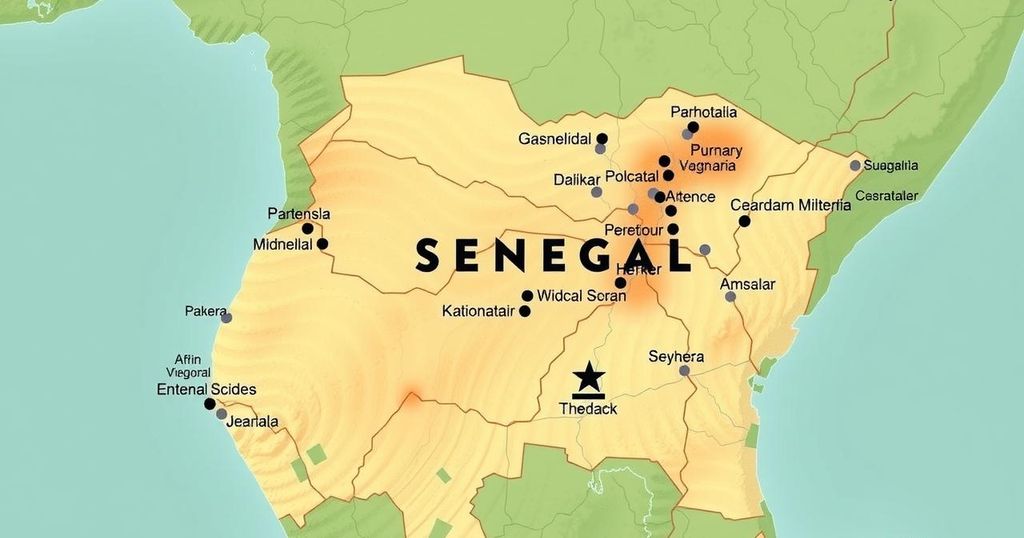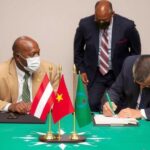Politics
AFRICA, AGENCE FRANCE - PRESSE, ASIA, BASS, BASSIROU DIOMAYE FAYE, BURKINA FASO, CHINA, CORRUPTION, COUP, DAKAR, EMMANUEL MACRON, EUROPE, FAYE, FRANCE, GHANA, ITALY, IVORY COAST, LUIGI DI MAIO, MACK, MACKY SALL, MALI, MILITARY COUP, NIGER, REGIONAL AFFAIRS, REGIONAL COOPERATION, SENEGAL, US, WEST AFRICA
Sophia Klein
Senegal’s Departure from French Military Control: A Shift in West African Sovereignty
Senegal’s recent transfer of military control from France signals a broader West African reexamination of colonial relations. President Bassirou Diomaye Faye’s move emphasizes national sovereignty, aligning with similar sentiments in other nations like the Ivory Coast and Ghana. Younger leaders are increasingly focused on decolonization and economic independence, sparking a movement towards dismantling colonial legacies across the region.
France has officially transferred control of two military bases in Dakar, Senegal to the Senegalese government following President Bassirou Diomaye Faye’s announcement that all foreign troops must exit the nation. President Faye emphasized the need for Senegal’s sovereignty, stating, “Senegal is an independent country, a sovereign nation, and sovereignty does not allow for the presence of foreign military bases.” Unlike military-led regimes in Burkina Faso, Mali, and Niger, this decision arises from a democratically elected government.
As other democratic nations in West Africa evaluate their relationships with Western powers, the Ivory Coast has similarly called for the termination of its colonial-era military pact with France, and there are indications that Ghana may request the exit of U.S. troops. The actions of these democratically elected leaders mirror those of military rulers in the region, raising questions about the motivations behind this reassessment of foreign military presence.
Younger African leaders are prioritizing the decolonization of their nations, propelled by a collective memory of unsuccessful foreign-backed governments and a growing awareness of the exploitation of Africa’s resources. Some commentators link these developments to targeted disinformation campaigns against France and other Western countries, while others note that previous foreign interventions have largely failed to support African populations effectively.
To strengthen its autonomy, Senegal intends to replace the CFA franc, which is under French control, with a national currency. This shift may challenge its relationship with France, especially following past dismissals of the CFA franc’s impact on development by French President Emmanuel Macron. Additionally, Senegal’s government plans to rename streets and landmarks associated with colonial figures while updating educational materials and establishing a department for managing national heritage.
Across the region, there is a trend to rename colonial-era streets; for instance, Avenue de Gaulle in Niger has been rebranded as Avenue Djibo Bakary. In Uganda, a court ruling has mandated the removal of British colonial monuments and the renaming of streets honoring colonial figures, illustrating a broader movement towards rejecting colonial legacies.
The political atmosphere in Africa, particularly in the Sahel region, is witnessing a revival of independent sentiments, reminiscent of the 1960s independence movements led by figures like Amílcar Cabral and Nelson Mandela. Recently, military leaders have garnered support from the population despite coming to power through coups, indicating a potential shift in public perception towards these leaders as symbols of resistance against foreign encroachment.
While some experts caution that expelling foreign troops could lead to instability, historical evidence suggests that foreign military interventions have failed to bolster security in the Sahel, which has remained vulnerable to violence for several years. With rising death tolls attributed to militant attacks, it becomes increasingly crucial for Africa to lead its security and economic strategies through equity in international relations, prioritizing development, education, and dialogue with marginalized groups.
In summary, Senegal’s liberation from foreign military presence marks a significant moment in West Africa’s reevaluation of colonial ties. As democratically elected leaders like President Faye champion sovereignty and decolonization, other nations in the region follow suit. The shift indicates a collective desire for economic independence and control over national resources, alongside a movement towards reestablishing cultural identity through the renaming of colonial landmarks. This evolving political landscape reflects broader sentiments among the African populace, advocating for a redefined relationship with former colonial powers that prioritizes mutual respect and equal partnership.
Original Source: www.inkl.com








Post Comment